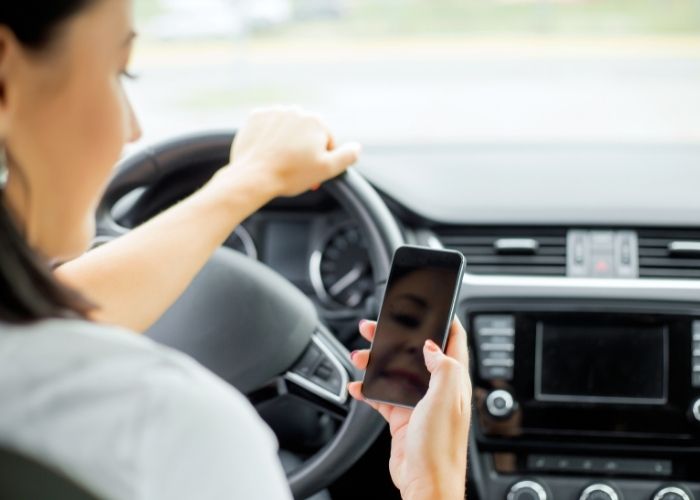Having a WhatsApp conversation while driving reduces attention span in traffic by as much as 53%. This is according to a report on phone use. Fatigue, sleepiness, and distraction behind the wheel add to this.
The report was produced by la Fundación Mapfre, a foundation of Spanish insurer Mapfre whose mission is to improve the lives of individuals, together with research firm Adhara Research and the IMS, the Spanish Institute for Sustainable Mobility.
24 drivers
The study involved a group of 24 drivers. Half of them were tired and sleepy, and the others were rested (at the start of the day and after having slept normally the night before). They got behind the wheel of a driving simulator. This monitored their brain activity while they answered messages and talked on the hands-free system.
The report was presented by Fundación Mapfre’s Director of Prevention and Road Safety, Jesús Monclús. He concluded that using hands-free and sending messages via WhatsApp while driving doubles the risk of committing serious errors. These include going off the road, colliding with another vehicle, or hitting a pedestrian.
Relaxed or stressful
Having a ‘relaxed conversation’ reduces attention span by 36%, a percentage that increases to 40% when the conversation is ‘stressful’. The study thus confirmed the cognitive effort required of drivers, especially when the task they are performing with their mobile phone is more complex or stressful.
The report also found that tired and sleep-deprived driving reduced attention levels by more than half (52%). The drivers who started the test ‘tired’ increased their attention span when answering a three-minute relaxed or stressful call. Experts call this the ‘wake-up effect’ and warn that this effect of a call can be dangerous. Unlike what happens during conversations, at least during those first three minutes, the attention span during a WhatsApp conversation drops from the first second, and the ability and attention span to drive decreases from the first second for tired and sleepy drivers.
Women are more cautious
The results of this report show that especially women show more careful driving behaviour in order to minimise the risk created by a WhatsApp conversation, such as reducing speed and using the option to WhatsApp at a red light. As a result, female drivers make fewer mistakes in traffic. Another result is that older drivers commit fewer offences but make more mistakes. Whereas younger drivers commit more offences and consume more fuel, mainly because of their driving style.
Hands-free system obsolete?
Telephone calls should only be made when the vehicle is stationary and in a safe area. This is the only safe message to give while driving. The hands-free system is not a guarantee of safety behind the wheel,’ said Jesús Monclús, who also stated that the hands-free system – which has been permitted since 2003 – was ‘an appropriate decision based on the information available at the time’, but argued that the system ‘should be reconsidered’.
A distracted brain can work well in ‘automatic’ mode, when the demand for attention is normal, but cannot recognise potential risks in time or respond appropriately in a complex situation that requires 100% of our attention,’ he said.
Stiffer penalties
The new traffic law, currently being debated by parliament, provides for stiffer penalties for driving with a mobile device in hand, with fines of €500 and the withdrawal of six points from the driving licence. Currently, the fine is €200 and 3 points.
Read more: What will change with the new traffic law in Spain?


